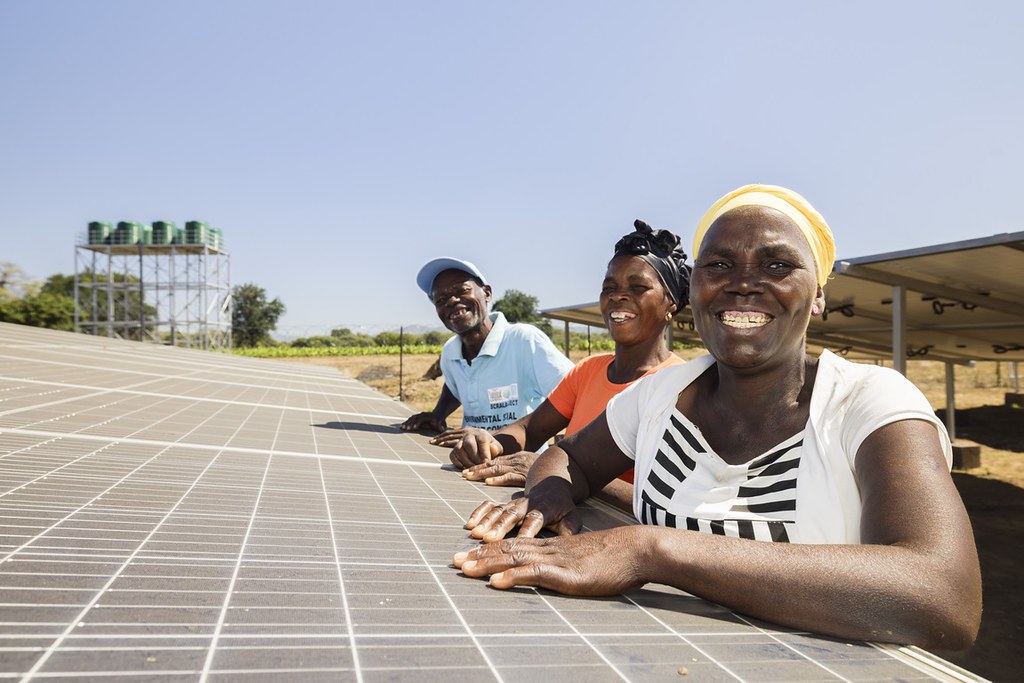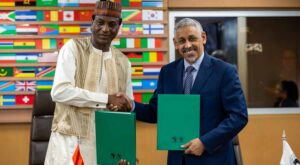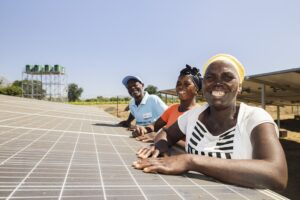The African Development Bank (AfDB) has approved a $14.54 million financing package for the Garneton North Solar Project, marking another strategic investment in Zambia’s efforts to expand renewable energy capacity and address persistent power shortages. The 20-megawatt solar photovoltaic facility in Copperbelt Province represents a growing pipeline of clean energy projects aimed at modernizing the country’s electricity infrastructure.
Strategic Investment in Energy Security
The financing structure includes $7.27 million from the AfDB’s own resources, matched by concessional funding from a Development Finance Institution. This arrangement demonstrates the multilateral development bank’s commitment to leveraging its capital to attract additional investment in Africa’s energy sector.
Once operational, the Garneton North facility is projected to supply electricity to approximately 82,000 people while eliminating 58,740 tons of carbon dioxide emissions annually. The project will connect to the national grid through a 10-kilometer, 33-kilovolt transmission line, adding critical capacity to Zambia’s strained power infrastructure.
“The project marks a key milestone in Zambia’s efforts to restore confidence in its power sector, attract private sector investment, and drive progress toward closing the energy gap and achieving Mission 300 goals,” said Wale Shonibare, Director of Energy Financial Solutions, Policy, and Regulation at the African Development Bank.
GETFiT Programme Unlocks Private Capital
The Garneton North project is one of six renewable energy ventures selected under Zambia’s Global Energy Transfer Feed-in Tariffs (GETFiT) programme, a government initiative designed to unlock private sector investment in small- and medium-scale independent power projects. Through this mechanism, Zambia aims to procure at least 120 megawatts of new renewable capacity from private developers.
The project is being developed by a joint venture between InnoVent, a French renewable energy company with operations in France and Africa, and Copperbelt Energy Corporation, a Zambian power utility with extensive experience serving the country’s mining industry. The consortium secured the project at a tariff of $0.048 per kilowatt-hour, achieved through competitive tendering without grant financing or pre-arranged concessional finance.
Under a 25-year take-or-pay Power Purchase Agreement, the Zambia Electricity Supply Corporation Limited will purchase all electricity generated by the facility. This long-term offtake arrangement provides revenue certainty crucial for project financing.
Employment and Local Development
The $24.5 million project is expected to create 90 jobs during construction, including positions for five women and 50 youth. During operations, 10 permanent positions will be maintained, comprising two women and six youth workers.
Beyond direct employment, the project supports Zambia’s broader capacity-building objectives within the renewable energy sector. Developers are required to implement trainee programs, hiring and training local university graduates in renewable energy project development throughout the project lifecycle.
Addressing Zambia’s Energy Deficit
Zambia has historically relied heavily on hydropower for electricity generation, but changing rainfall patterns and recurring droughts have exposed the vulnerability of this dependence. Power shortages and frequent blackouts have undermined economic activity and quality of life across the country, particularly affecting industries, hospitals, schools, and households.
By expanding grid capacity through renewable energy projects like Garneton North, Zambia aims to reduce the frequency and severity of power outages while improving overall energy security. The solar installation will help diversify the country’s energy mix and provide a more reliable electricity supply, particularly during periods when hydropower generation is constrained.
“By expanding renewable generation capacity, the project will help reduce the frequency and severity of power outages, ensure a more reliable electricity supply, and contribute to maintaining cost-reflective tariffs for consumers,” noted Jing Li, Division Manager for Energy Financial Solutions at the African Development Bank.
Alignment with Continental Priorities
The Garneton North investment aligns with several of the African Development Bank’s strategic frameworks, including its Ten-Year Strategy for 2024-2033 and the New Deal on Energy for Africa. The project also supports Mission 300, an ambitious continental initiative to provide electricity access to 300 million Africans by 2030.
Additionally, the solar facility advances the Bank’s climate change, gender equality, and youth employment strategies, emphasizing the integration of social and environmental objectives within infrastructure development.
Restoring Investor Confidence
The AfDB’s financing approval sends an important signal to private investors about Zambia’s commitment to creating a stable and attractive environment for renewable energy investment. After facing economic challenges and currency depreciation in recent years, Zambia has worked to re-engage international investors and restore confidence in its power sector.
The successful structuring and financing of projects under the GETFiT programme demonstrates that Zambia can deliver bankable renewable energy projects capable of attracting both development finance and commercial capital. This track record is essential for scaling up investment to meet the country’s substantial energy needs.
Investment Outlook
The Garneton North project forms part of a broader wave of solar investment in Zambia. The AfDB has recently supported other solar initiatives in the country, including an $8 million concessional loan for the 25-megawatt Ilute Solar Plant in Sesheke District, which features an innovative aggregator model and regional power trading structure.
With construction expected to commence in 2025 and commercial operations targeted for 2026, the Garneton North facility represents a near-term opportunity to add generation capacity while demonstrating replicable models for private sector participation in Africa’s clean energy transition.
For energy investors seeking exposure to Africa’s growing renewable energy sector, Zambia’s combination of genuine power deficits, supportive policy frameworks, creditworthy offtakers, and multilateral development bank backing creates an increasingly compelling investment case. The successful execution of projects like Garneton North will be closely watched as indicators of the country’s ability to deliver on its renewable energy ambitions and attract sustained private capital flows.





